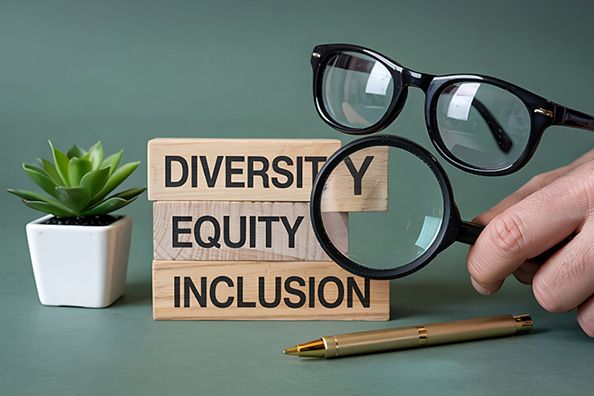Over the past decade, diversity, equity and inclusion initiatives have become part of corporate culture. Employers began implementing hiring practices, training programs and internal policies aimed at promoting representation and equal treatment of minorities in all facets of employment. However, as a result of changes to the policy and legal landscape, these DEI initiatives have been under attack. Critics of these initiatives contend that DEI practices and policies aimed at curbing discrimination are, in fact, discriminatory themselves.
In 2023, the U.S. Supreme Court found that race-conscious affirmative action (using racial preferences in the college admissions process) by higher education institutions that accept federal funding violated the Equal Protection Clause of the 14th Amendment to the U.S. Constitution.*
In January 2025, President Donald Trump eliminated DEI programs across the federal government when he signed Executive Order 14173, entitled “Ending Illegal Discrimination and Restoring Merit-Based Opportunity.” EO 14173 also encourages the private sector to end “illegal discrimination and preferences, including DEI.” Further, in January 2025, Indiana Gov. Mike Braun signed Executive Order 25-14, entitled “Ensuring All Hoosiers Have Equality of Opportunity by Eliminating DEI in State Government.” Gov. Braun’s EO 25-14 prohibits all DEI efforts in state government.
Because of these shifts in policy and the legal landscape, employers face a challenging paradox. Those who continue to promote DEI efforts are confronted with potential legal risks, while those companies rolling programs back risk possible reputational harm and public backlash. In light of these competing threats, private employers seeking to maintain some form of DEI must take earnest and intentional steps to re-evaluate their policies and practices to ensure compliance and limit legal risks.
Guidance From the EEOC and DOJ
In March 2025, the U.S. Equal Employment Opportunity Commission and U.S. Department of Justice issued guidance outlining when a DEI initiative, policy or practice may be unlawful under Title VII. The agencies issued a joint one-page technical assistance document entitled “What To Do If You Experience Discrimination Related to DEI at Work” and an EEOC technical assistance document entitled “What You Should Know About DEI-Related Discrimination at Work.” The EEOC and DOJ maintain that under Title VII, DEI initiatives, policies, programs or practices may be unlawful if they involve an employer, including a financial institution, or other covered entity taking an employment action motivated – in whole or in part – by an employee’s or applicant’s race, sex or other protected characteristic.
What Employers Need to Know
In this ever-evolving area, legal ambiguity has made it very difficult for employers to balance compliance with institutional goals related to inclusivity and equity. Moving forward, current guidance holds:
- Title VII applies equally to all employees, regardless of race, ethnicity, national origin or sex, and in all terms, conditions or privileges of employment. Employment decisions based on any protected characteristic may be unlawful. In addition to traditional employment decisions, such as hiring, firing, promotion and compensation, this also includes access to or exclusion from a training or leadership program (e.g., minority or female leadership development programs); a mentoring, sponsorship or networking program; or an internship or fellowship.
- Depending on the facts, DEI training may create a hostile work environment. Title VII prohibits workplace harassment, which may occur when an employee is subjected to unwelcome remarks or conduct based on protected characteristics. Employees who can plead or show that a training is discriminatory in content, application or context may be able to maintain a cause of action for a hostile work environment.
- DEI programs cannot limit, segregate, classify or exclude employees based on a protected characteristic. This can include breaking employees up into groups when administering trainings or programming if the division is based on a protected characteristic. It can also include limiting membership in employee resource groups or other affinity groups. It should be made clear that such employer-sponsored groups are open to all employees regardless of race, sex or other protected characteristic.
- Employers cannot excuse DEI-related considerations based on a “business necessity” or interest in “diversity,” including preferences or requests made by clients and customers.
- Employees who reasonably oppose DEI policies or practices are protected from retaliation under Title VII as their opposition may constitute protected activity.
- Unlawful discrimination exists even if a protected characteristic is “just one factor among other factors contributing to the employer’s decision or action.”
Because this area is evolving, employers should stay informed and consult with experienced legal counsel to assist in navigating this uncertain territory.
Information in this article is provided for general information purposes only and does not constitute legal advice or an opinion of any kind. You should consult with legal counsel for advice on your institution’s specific legal issues.
FOOTNOTES
*Students for Fair Admissions v. President and Fellows of Harvard College, 600 U.S. 181, 213 n.4 (2023).

Joey K. Wright, Attorney, Amundsen Davis LLC
As an attorney with nearly a decade of experience, Joey uses her knowledge and voice to make a difference for her clients and their businesses. She thoughtfully represents employers facing a variety of employment issues, including hiring and firing, discrimination and harassment, compensation, and discipline.
Email Joey at JWright@AmundsenDavisLaw.com.
Amundsen Davis LLC is a Diamond Associate Member of the Indiana Bankers Association.









